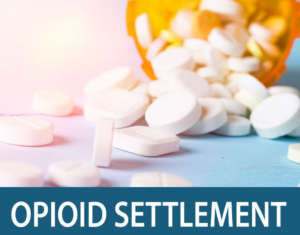
(Healthcare Brew, Shannon Young) — With states set to receive more than $50 billion in opioid settlement funds over the next 15 years, advocates are urging policymakers to ensure the money is spent on public health interventions, like harm reduction efforts, and other programs that directly help people affected by substance use disorder.
A coalition of 130+ organizations that work on the opioid epidemic frontlines released a roadmap in late August to guide settlement fund spending. The $50+ billion from settlements reached with drugmakers, distributors, and sellers—including Johnson & Johnson, Purdue Pharma, and others—will be distributed to states and Washington, DC; councils in many of the states are to decide how that money will be used.
Mariah McGough, spokesperson for grassroots advocacy group Vocal-NY, said the 10-page document is “a warning to policymakers that if these funds are mishandled and funneled into criminalization, it’s only going to make [the opioid] crisis worse and cost more lives.”
The roadmap calls for investments in public health, housing supports, community-based organizations, and other efforts that address “collateral consequences of drug war policies.”
The coalition touted Rhode Island’s decision to dedicate $2 million of its settlement dollars to support an overdose prevention center and Kentucky’s move to grant $1 million to four legal aid groups that support people who use drugs as examples of “good spending.”
“We know what works, and we also know what doesn’t work,” Vinay Krishnan, national field organizer for the Center for Popular Democracy, said at a recent virtual news conference. “We know that police, prisons, carceral approaches—criminalization—do not work. You can’t arrest your way out of a public health crisis.”
The roadmap argued that the $50 billion should not be used for criminalization or incarceration, family separation, abstinence-only treatment and education, or bolstering state general fund revenues. The coalition pointed to Louisiana’s decision to allocate 20% of its settlement funds to sheriffs and Maine’s plan to spend some of its money on a program embedded with police as examples of “problematic spending.”
The coalition further contended that decisions on opioid settlement fund spending should be transparent and include people and communities directly affected by the “war on drugs,” including active drug users. No state, the document noted, is “fully adopting” the coalition’s priorities.
“While the roadmap, and the signers of the roadmap, come from different states and regions and political landscapes, we are united in calling for divestment from criminalization and investment in life-saving harm reduction strategies,” McGough said.
States have already started receiving opioid settlement funds, which are expected to be distributed through 2038.

Prenatal education and prevention. School education and offering safe spaces to exercise and stay engaged in adolescence and young adulthood in our rural counties.